- Home
- Doug Walker
An American Pope Page 3
An American Pope Read online
Page 3
Hilda, who had been munching pretzels right along, attempted to put an end to the conversation by stating, “Well, gentlemen, I’m for returning to Germany.”
But she agreed to stay a few days longer when promised her own menu, choice of wine and recent videos. And the two Jesuits said they would depart for Germany at dawn on the morrow.
CHAPTER TEN
Cardinal Black, meanwhile, resumed his interview with Justin Scott, first questioning him about the Christian novella he had penned some years ago.
“The protagonist, I think you call the main character that, is a young woman who was raised from the dead by Jesus shortly before he was executed. She seems to have a mystical connection to the Savior and knows what is happening to Him up and beyond the crucifixion.”
“This all came out of your head?” Black questioned.
“Yes and no. It was some time ago that I wrote it, ten years or so. I have it with my documents, so it’s available on line. But I had read some things similar to the theme. Miracles, mystic happenings, these things were common, particularly in those days.”
Black nodded in agreement. People living for hundreds of years, bearing children at one hundred plus, entire armies returning to life. He didn’t really like to think about such happenings, but they were all part of his religion. In for a penny, in for a pound.
Justin continued. “She is compelled to seek out a Roman officer, who happens to be the emperor’s nephew, and influence him to conduct her to the seat of Roman power. The Emperor Tiberius, despised by many, feared by all and probably insane, had fled to the island of Capri, fearing for his life. On that island he conducted ghastly orgies, snuffing out the lives of young people rounded up for his vicious sport.”
“This would be shortly after the execution of Christ?”
“Exactly. The Roman officer was quite taken with the young lady whose name translated as Little Wolf. He and his troopers managed to take her to the island, and Tiberius was quite impressed. He had grown weary of worshiping marble statues and longed for a new religion. Then the Roman captain, whose name I think was Drusus, manages to take the girl and his troops back to the Holy Land where an all-out effort is underway to stamp out the followers of Christ.”
“That’s a bit early for any organized Christianity,” Black observed.
“You have a point there, but this is fiction, and occasionally reality is suspended.”
“Continue.”
Captain Drusus is still in control of Little Wolf who had been in something of a trance, but she is returning to reality after her mission has run its course. Anyway, there’s a group of early followers of Christ, and Drusus is ordered to take a contingent of troopers and herd them far into the desert, there to abandon them without food or water, leaving them to perish. He has fallen under the spell of Little Wolf and Christ. He hand picks the troops, and they march off with the early Christians, making a large circle back to a remote seaport to board vessels and make their escape.”
“That’s it?” Black questioned.
“The ends are tied up. Drusus and Little Wolf marry. Certain members of the party go this way, some go that way. Everyone seems to thrive. I assume they enjoy life into ripe old age. Children, grandchildren, herds of goats, sheep, kitchen gardens, vineyards, lots of wine, what-have-you.”
“Sounds like a story made in Heaven for Hollywood.”
Justin cracked a large grin. “That was my hope. Maybe the Vatican can produce it. It would play great as a musical.”
“I’ll see what I can do.”
CHAPTER ELEVEN
Fathers Pat and Konrad returned from Germany and checked in with Cardinal Black.
“The doctor is definitely senile,” Konrad began. “He remembers very little about Hilda Krieg’s case, but the records are quite clear. She was seriously injured in an auto accident about a year ago. The doctor made a note at that time that she would very likely be wheelchair bound for the remainder of her life. However, from the folks we spoke to, she worked hard and managed to move about quite handily with a walker.”
“But still a cripple,” Black said.
“Yes. According to everything we have learned.”
“So you are confirming a miracle?”
Neither priest spoke for a moment. Finally Pat said, “There seems to be no way out. I’m guessing we could investigate until hell won’t have it, but the facts will remain the same.”
“What facts do you speak of?”
“Medical records. The nurses’ testimony.”
“Also friends and neighbors,” Konrad tossed in.
Black looked perplexed. Something was wrong. “The facts are there, but you two remain skeptics.”
Both men nodded in agreement. “We are skeptics,” Pat said. “We’ve talked this thing through from start to finish several times, but we remain not totally sold on Hilda’s story.”
“What about the man? What about Justin Scott?”
Konrad shrugged. “As far as I’m concerned he simply saw her fall and picked her up. Anyone might have come to her assistance.”
“But if it was a miracle?” Black questioned. “How would he figure in?”
“I’ll let Pat answer that,” Konrad said. “I’m really not into miracles.”
“How can you be a Catholic, particularly a priest, and not believe in miracles?” Black questioned. He had long wondered how many Catholics, particularly among the clergy, actually believed in miracles. He had done the best he could to ignore them, but they were part of the grand scheme.
“I simply don’t believe in miracles,” Konrad said. “I’ve mentioned it to my confessor from time to time. He didn’t seem to think it was much of a sin. We are all here together. This is a livelihood, and we are attempting to do good in this sinful world. We each have a very small role to play while life endures.”
It crossed Black’s mind to ask Konrad if he believed in the afterlife, but there were more important issues at hand. He asked Pat for his take on the event.
“Well, you have brought up a point that has been in my thoughts from time to time. Whether there is a miracle here – and there seems to be one according to the known facts, although there may be unknown facts that we are not aware of, and in that case the unknown facts might negate the known facts – but simply if there is a miracle, Hilda fell, sprawled in the aisle, and Justin Scott picked her up. If Hilda was cured miraculously, could it have been Justin’s touch that did the job?”
Konrad smiled and shook his head in amused disbelief. “Pat has mentioned this to me more than once. In that case we might be dealing with two miracles. That is a woman miraculously cured and a man who somehow has acquired healing hands, perhaps straight from the Almighty.”
“Yes, that could be,” Black said. He seemed pleased with Pat’s theory. “Now tell me why both of you are skeptics.”
“I can fill you in on that one,” Konrad said. “Hilda was the proprietor of a coffee shop that had fallen on hard times. It was on the point of closing when she had her so-called accident. You know the German’s take care of their own, so the state took care of her fairly well during her convalescence. She also has a large number of friends and relatives in her immediate area, each of whom will endorse anything she says. She is quite the charismatic character.”
“You think these people would lie for her, if they knew the facts?”
“Probably, but that’s not all. The doctor suffering from dementia has a veteran nurse who happens to be Hilda’s aunt. The aunt of course has complete access to the records. In fact she usually makes the records, as the doctor is barely able to function as a physician. His license should have been lifted some time ago.”
“So there may be a conspiracy?” Black suggested.
Both Jesuits agreed.
“But the facts contradict a conspiracy. Am I right?”
“One hundred percent,” Konrad said.
“Can I trust you both with a confidence?” Black asked. He looked from one to the ot
her, grim faced, deadly serious.
“We are priests,” Pat said.
“Jesuits,” Konrad added.
“Justin Scott is thirty-two years of age. He has a liberal arts degree from some state school in America. He studies French and Italian in Paris in hopes of joining his country’s foreign service. He served as an altar boy in his youth, and in his younger days wrote an interesting religious novella. Unpublished I might add. He is single and healthy. Pat may very well be right that he had something to do with the woman’s miraculous cure, that his touch in bringing her to her feet was in fact the reason for her cure. That it is a sign from above. I’m strongly considering proposing him as a candidate for pope.”
You might say both priests were dumbfounded. Because that would be a known fact. They were speechless for a few seconds while Black studied their faces.
“A thirty-two year-old American, not a member of the clergy,” Pat finally said.
“Exactly,” Black agreed, although Pat’s statement was in disbelief. “Think what it would mean to the Catholic Church in America. There would be a resurgence, a renewal of the faith, churches would come alive again, pews would be full, not to mention that coffers and good works would flourish. South America and Canada would share the bounty. In fact the entire world would sit up and take notice. Even Asia.”
“Holy Christ,” Konrad said in wonder.
CHAPTER TWELVE
Jesuits or not, Cardinal Black did not believe the two priests could keep to themselves the information he had imparted. With this in mind, he called together the See of Cardinals as soon as possible, although swift is not in the Vatican lexicon. Many of the cardinals are archbishops of the largest dioceses in their countries, or regions, thus long accustomed to common folks bowing and scraping, plus having their slightest desire fulfilled.
They had been to so many sessions wrangling over the choice of a new pope that many did not bother to wear their ordinary dress – a black cassock with scarlet piping and buttons, as well as a scarlet sash, a pectoral cross on a chain and to top it all off a scarlet zucchetto, a small, hemispherical, form-fitting skullcap.
They chatted noisily as they waited for Black to begin the session. Some snacked on a variety of candies or salty treats. One had a package of gummy bears, while several had small bottles of wine, even though the hour was late morning.
“We have met in solemn conclave quite a few times,” Black began.
A cardinal nearby was heard to stage whisper “solemn conclave” in a mocking tone. A few of his fellows chuckled.
“In total sincerity I wish to report a sign, a message from on high that might lead down an innovative path to choose a successor to the late pope, whom we all held in high regard.
“At a recent mass, one in a series to pray for divine guidance, there was an event that seemed to be miraculous. A middle-aged German woman arriving late, using a walker to come down the aisle, fell in a heap. She was a cripple. A man seated nearby rushed to her aid, in fact picked her up, and she was healed on the spot.”
A murmur of voices among the cardinals. Black waited until it subsided.
“I took the responsibility of interviewing the man who picked her up. The investigation of the woman herself, including medical records, friends and acquaintances in Germany, was carried forward by two respected Jesuit priests. They concluded the event had been a miracle.”
More chatter among the cardinals. Some were aware of the event. To classify it as a miracle so soon ran contrary to church tradition.
“I was seated at that mass looking toward the congregation. The sight of the latecomer caught my eye, and I viewed the entire incident. Oddly enough, and perhaps it was my imagination, but I thought I detected a certain aura among the two participants, a certain unearthly glow, possibly a divine sign, but maybe not.”
Again muttering from the assembled cardinals.
“During my interview of the man involved, I learned his name is Justin Scott, thirty-two years of age, studying French and Italian in Paris, hoping to enter foreign service in his native America. A lifelong Catholic, he served as an altar boy. He also wrote a religious novella in his younger years, unpublished I might add. I’ve read it and it shows early promise.
“What a thing we would do if we would elect such a person pope. What new ground we would break, what a boon to the church in North and South America, what a standout group of historic cardinals we would become.”
It took his words fully thirty seconds to sink in, then a rising torrent of voices, strictly pandemonium! Black took his seat and waited for the tide to subside.
Finally, a strong-voiced Cardinal, Angelo Goicoechea, stood and denounced Black and his radical idea. “What nonsense is this? What idiocy. And who would come up with such an idea? An American from the liberal wing of the church. I thank God that most American Catholics are conservative as they should be. How this man Black ever slimed his way into our midst is beyond me. I think we should take an immediate vote to censure him and start excommunication proceedings.”
His words were greeted with approval from quite a few cardinals. Black had known that would be the case and that he would have a fight on his hands, very likely a losing battle. But he also knew that despite the solemn vows of secrecy, word would get out that he had proposed a young American Catholic for the post of pope. If that was his singular accomplishment, he would be satisfied.
The next to rise while the flurry of chatter was still reverberating through the ancient cavernous room was Cardinal Jozef Gagnon who moved that the meeting be adjourned so the cardinals might reflect and look at every angle of the suggestion through a crystal eye.
He was shouted down by several cardinals who wanted to thrash the issue out now at this session.
CHAPTER THIRTEEN
At last the talking subsided and the cardinals sat and waited for the next member to rise with some pronouncement or the other. One thing they were generally good at was sitting and waiting. Each in his own way had learned that such a posture portrayed the silent one as being filled with wisdom. A benevolent look also helped.
It was Cardinal Mario Pujalte who took the floor, known as a non-stop speaker once he got started. Those cardinals who had brought wine were seen to take a few sips in hopes of dozing off.
“In the past,” Pujalte began, “when an immediate decision could not be made, it has sometimes been a practice to elect an old, possibly an ailing cardinal to the post of pope. This gives us all a chance to step back, take a breath, and put on our thinking caps while waiting for the new pope to die.”
“What a heartless approach,” one of the newer cardinals said.
“Yes, but it’s true,” Pujalte declared. “I might add that whoever the old man might be who is elected pope, that this will be his last stop before arriving at his heavenly home. Also, that old man would have a shot at sainthood. So it’s not so bad.”
“His sons, daughters and other offspring might appreciate it,” a comedian chimed in, which brought a few chuckles from the assembled celibates.
“And that is part of my point,” Pujalte continued. “We nominate and elect old men to be pope for another reason. A young priest, and this has likely happened to a few of you, the temptation, can be seduced by an attractive parish member. You all know there are lascivious women out there who would love to add a priest to their stable of men. Well, what about a young pope? We elect old popes because they are beyond temptation.”
“And beyond many other things,” Black tossed in. “Beyond any liberal thought, beyond any innovation, beyond anything that hasn’t been tried for the last ten or fifteen centuries. One of my points is simply this. We have found an able young man. There has been a sign from above. Surely we all believe in miracles and the hand of God. Let’s try something new. Let’s step out boldly and energize the old church. Let’s try it and see what happens. Shake the stodgy old ways.”
“One more point,” Pujalte continued. “If, God forbid, we elected a thirty-two-year
-old pope, he might serve for sixty years, long after anyone here has died and gone to heaven. Think of that. What if we made a bad choice? He might let women into the priesthood. He might be pro-abortion. He might believe in contraception.”
“A young man like this,” Black interjected, “would need, and I believe he would accept, guidance. He would not try to overthrow the church as we know it. But he would invigorate and renew interest simply by being a young man from America. We cardinals would offer protection and guidance.”
“But what a radical experiment,” one of the older heads shouted. “We were debating the qualifications of Cardinal Giovanni Piovanelli, and he is a fairly young man to be in this situation. I suggest we adjourn for several days in order to come to our senses. We’re at the point where a simple majority is enough to swing the election.”
CHAPTER FOURTEEN
Few seemed interested in early adjournment; most were following the debate with keen interest, even the wine bibbers were now fully awake. It was at this point that the most popular cardinal, albeit soft on child abuse, rose to address the conclave. That same Giovanni Piovanelli.
“You all know me and know I’ve been in contention as candidate. I’ve talked to each and every one of you publicly and in private. And you know I would submerge my feeling about relations between men and boys if I were to become pope. I hope you also know me as a person who is not set in his ways, who can be flexible on many issues. My feeling is the majority of the learned men here should rule.”
Cardinal Black braced for what was coming. Because of Piovanelli’s popularity and his skill as a public speaker he felt that this would be the deathblow to his innovative proposal.

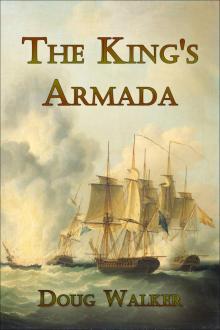 The King's Armada
The King's Armada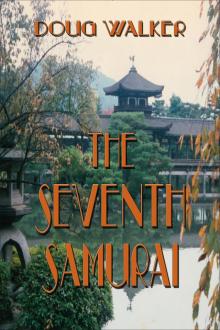 The Seventh Samurai
The Seventh Samurai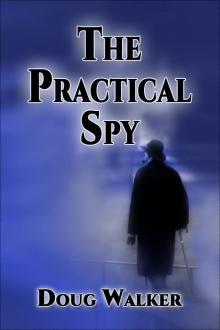 The Practical Spy
The Practical Spy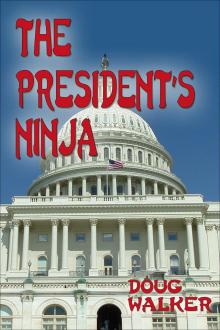 The President's Ninja
The President's Ninja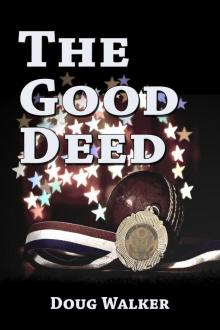 The Good Deed
The Good Deed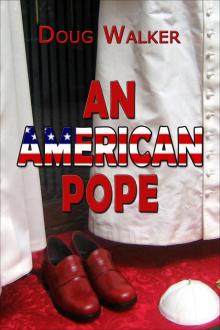 An American Pope
An American Pope